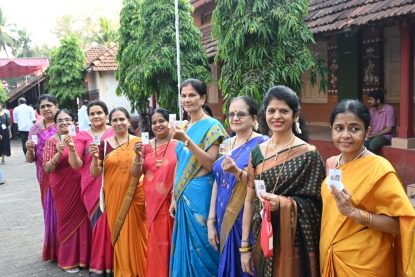
Can we improve on a once-in-a-century TB vaccine?
PTI, Apr 22, 2022, 11:15 AM IST

It has been over 100 years since the last licensed tuberculosis vaccine. The clock is ticking to find a new one.
Tuberculosis (TB) remains one of the deadliest infectious diseases known to humankind. The existing TB vaccine is highly protective, but it has some limitations.
A new model will allow scientists to compare vaccines in development so they can be ranked. As the model is refined, the hope is that it will deliver an improved vaccine for TB – and other illnesses – much faster.
Caused by the bacteria Mycobacterium tuberculosis, TB has coevolved with humans over centuries. It still claims the lives of around 1.5 million people annually. A quarter of the world’s population is latently infected.
Treatment of the disease requires months of intensive therapy with high-quality antibiotics.
Those with active TB may cough up blood or experience fever, chills, and weight loss, among other symptoms.
In many parts of the world, access to life-saving medications can be limited, and the stigma attached to the disease often complicates treatment.
The only licensed TB vaccine, Bacille Calmette-Guérin (BCG), was first administered in July 1921. BCG has saved millions of lives, protecting infants and children against various forms of the disease.
However, the vaccine’s protective capabilities diminish over time, becoming ineffective as recipients reach adulthood.
BCG also fails to protect against pulmonary TB, a form of disease that allows transmission from an actively infected person to an uninfected person.
Strains of TB that are multidrug resistant (hard to treat) and extensively drug resistant (even harder to treat) have spread across the globe, and TB remains a global health priority in the UN’s Sustainable Development Goals.
Developing new vaccine candidates continues to be of paramount importance. One strategy has been to genetically modify BCG to incorporate genes that code for some of Mycobacterium tuberculosis’ disease-causing proteins.
This could prompt the body’s immune system to recognise and destroy TB upon entry into the lungs. However, the resulting BCG strain must not become virulent enough to cause the actual disease.
A 2020 study to advance this approach, undertaken by the Australian Institute of Tropical Health & Medicine, suggests that carefully designed strains of genetically modified BCG could retain the safety profile of standard BCG while generating a more comprehensive immune response in the recipient.
One challenge in such a large-scale undertaking is interpreting the results: when new vaccines are being developed by different research groups around the world, it is difficult to feasibly make direct comparisons between every potential TB vaccine.
The ‘Vaccine Empirical Integrated Model’ (VEIM) has been developed in a bid to overcome this obstacle.
The model aims to integrate multiple measurements of vaccine safety, whether it triggers the immune system, or protection, producing a ranking system to help guide scientists in how vaccines compare head-to-head.
This model is still in its infancy, but the hope is that scientists with different areas of expertise will refine the model and produce a ‘gold standard’ that streamlines the vaccine development and testing process. This in turn would speed up the development of new vaccines.
The way TB vaccines are administered has also been rethought. Traditionally, vaccines are injected into muscle or skin tissue, inoculating the recipient with the necessary material to develop a specific yet systemic immune response.
However, a strong body of evidence demonstrates the benefit of matching the route of vaccine delivery to the route the disease enters the body. In the case of TB (a respiratory-spread disease), this could mean administering the vaccine directly into the respiratory system.
Nasal spray vaccines such as ‘FluMist’ have already been approved for use and serve as a possible avenue for a respiratory-delivered TB vaccine. Booster dosing has also garnered attention.
The emergence of new infectious diseases with pandemic potential, such as SARS, MERS, and COVID-19, highlights the importance of rapid vaccine development.
Currently, 21 new TB vaccine candidates have entered clinical trials, and several others are in their preclinical phases.
While some of these candidates have demonstrated a reasonable degree of efficacy in human studies, BCG remains the gold standard.
With an exponentially increasing population, mass land clearing and climate change contributing to a drastic transformation of our natural environment, the risk of frequent pandemics is rising.
By developing a universal method to compare new vaccine candidates, scientists will be able to advance their long-standing battle with TB and be more equipped to respond to the next pandemic.
Udayavani is now on Telegram. Click here to join our channel and stay updated with the latest news.
Top News
Related Articles More

World Malaria Day: WHO calls for equitable health access

What role does genetics play in breast cancer? How can genetic testing help with early breast cancer diagnosis?

Father’s diet can affect anxiety in sons, metabolism in daughters: Study in mice finds

Low back pain, depression, headaches main causes of poor health: Study

Surgical options for Parkinson’s disease
MUST WATCH
Latest Additions

Karnataka officials don vibrant sarees to promote voter participation

Omar, Mehbooba ask EC not to postpone polls in Anantnag-Rajouri LS seat

SC to consider plea of MP Bar Council leaders against contempt proceedings

Karnataka sees over 22% voter turnout in 14 Lok Sabha seats by 11 AM

7 intermediate students die by suicide after announcement of results in Telangana
























